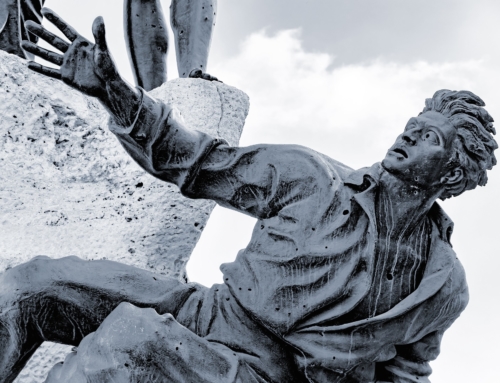If you were to consult a dictionary for terms like “heroism”, “perseverance”, “loving fidelity” and “longsuffering goodness”, you would likely come across a reference to a little Chinese mother known as Mamma Martina (her Christian name).
A retired Italian missionary, who personally knew Mamma Martina, worked in a parish I used to visit some years ago and often told the saga of this amazing lady.
Her goodness is a story for the ages.
The heavy hand of tyranny
In the mid-1950s Mamma Martina was a widow with six sons, all in their teens and twenties. She and her family were members of the Chinese Underground Church during the reign of the Communist Dictator, Mao Zedong, who ruled China with an iron hand from 1949 to 1976.
According to the priest, Mamma Martina woke one night in 1955 to the sound of the police beating down her door. Without warning, and for no other reason than that they were Christians, the police arrested all of her sons in one fell swoop and hauled them off to six different prisons spread over the vast region in which they lived.
The divide-and-conquer tactic broke up the family and assured that the brothers could have no communication with one another. Being in six separate prisons also made it difficult for anyone to visit them. If Communists did anything efficiently, it was to destroy families.
The young men were each sentenced to more than a dozen of years of imprisonment for the sole crime of being Christians.
A mother’s response
Thus commenced a decades-long ordeal for Mamma Martina to keep the flame of faith alive in the hearts of her sons while they endured loneliness, injustice, desolation, and even torture in Communist prisons.
The missionary priest didn’t detail the distances she had to travel to see her sons, but he did note that the sufferings and heroic labors of this Chinese widow were so extraordinary that people named her, “Our Mother of Sorrows”.
Her story illustrates that title well. Like the Mother of Christ, she faithfully stood by the cross of her sons’ suffering in an unparalleled act of heroism.
Mamma Martina dedicated herself to visiting each of her six sons on a regular basis in their respective prisons leagues apart from each other. She would sew clothes and bake cookies for them and go to the prisons asking to see them. More often than not she was refused entrance. Her response was to camp out in front of the prison gate until the she wore the guards down and made even the heartless agents of evil feel the shame of their wickedness. They eventually, grudgingly, let her in.
The guards and prison officials often abused her with the typical Communist slander – “enemy of the state” – and ridiculed her for her faith. But Mamma Martina persevered, one prison visit after another, year-in and year-out.
An indomitable spirit
From a merely human point of view, her frequent travels and long vigils were a pointless waste of time and energy against an overwhelming political power. But we must think of her heroism from a spiritual point of view: imagine the impact of that mother’s indomitable spirit on the souls of her sons!
Would you be strengthened if, in the midst of torture, abandonment, and desolation, you knew that your mother was sitting outside the gate of your prison keeping vigil for you? I certainly would.
Mamma Martina’s story helps us penetrate more deeply into the mystery of Our Lady’s presence at Calvary (John 19:25-27). Her silent presence at the foot of the Cross had no immediate practical value to anyone other than her Son. In placing herself there, in total self-sacrifice, she became one with His suffering.
This woman’s courageous efforts on behalf of her six sons was not a short-term endeavor. It lasted not a month or two but extended across several decades. According to the missionary priest, she kept up her sacrificial visits for close to thirty years.
The story has a happy ending, however. Mamma Martina eventually saw the fruit of her years of sacrifice.
The long-term impact
All of her sons were eventually released from prison, and, incredibly, five of the six entered the seminary and became Catholic priests!
We can read between the lines of this story to understand that the six sons never renounced their Christian faith in prison. Think of the temptation to renounce their faith or perhaps weaken under torture and harassment if their mother had not been like the vigil lamp in church, a gentle flame burning in silent witness outside the prison gates.
We know the amazing outward results of the story, but we can guess that even when she was not allowed to visit, Mamma Martina’s silent and often invisible presence in their lives had an enormous spiritual effect on her sons. As with the vigil lamp, her glowing presence pointed to the Real Presence of the Lord sustaining them in their trials.
Spiritual fruitfulness
Mamma Martina lived to attend each of her sons’ ordination ceremonies and witnessed the long-awaited fruit of her fidelity. The last of her sons to become a priest was 61-years-old when he was ordained, and Mamma Martina, age 94 by that time, was at his ordination too.
One night, forty years before that joyful event, Mamma Martina was rudely awakened by Communist agents who took all six of her sons away from her in a brutal reprisal for their faith.
Forty years later, she received all of her precious sons back. Then, like Mary, she offered them again for the souls of others.

Soul Work
All of us have been given souls to care for, and it is not an easy job to see a soul through the long journey of life to some kind of vocation or to the doors of salvation.
The truth is that no one saves himself. Our families, friends and communities have an important role to play in our spiritual welfare.
In a time of prayerful reflection today, call to mind those special people in your life who have personally cared for your soul in some tangible way, even if it was just a well-placed word of counsel or a helpful spiritual boost given along the way. Thank God for these souls and realize that He put them there for a reason.
Then identify, by name, those souls who have been entrusted to your spiritual care. You have that same burden of vigilance for others, some of whom may not make it to the end of the journey without you sitting silently and prayerfully at the gates of their prisons.




Leave A Comment